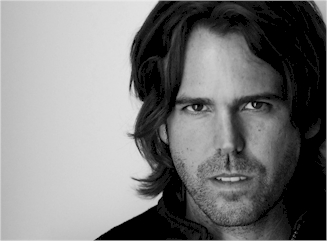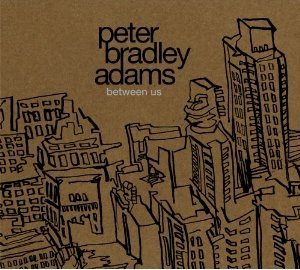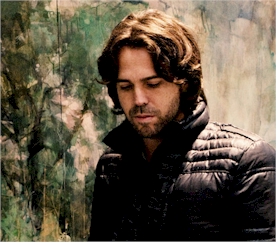 Most of us were introduced to Peter Bradley Adams when he was half of the fine duo Eastmountainsouth (along with his fellow singer/songwriter Kat Maslich-Bode), whose self-titled 2003 record showed considerable talent at work, and much potential. Much of that potential seemed to dissipate when the pair split, each member venturing off to individual efforts and expression.
Most of us were introduced to Peter Bradley Adams when he was half of the fine duo Eastmountainsouth (along with his fellow singer/songwriter Kat Maslich-Bode), whose self-titled 2003 record showed considerable talent at work, and much potential. Much of that potential seemed to dissipate when the pair split, each member venturing off to individual efforts and expression.
Adams’ route as a solo artist has led him to his fourth album, Between Us (released today). The gentle songs therein contain roiling truths about love, faith, and one’s struggle to find a place of comfort in a time that can be decidedly uncomfortable. Songs like “I May Not Let Go,” “Mother Don’t Look Down,” and the title track should provide Adams a place of recognition among our very best singer/songwriters. In a cacophonic crowd of sounds and personalities and listening choices, Adams’ hushed tones and insightful words are an exquisite beacon, and an enticement toward deeper introspection.
I spoke with Adams recently about Between Us, his songwriting process, and the travails of an independent musician in a congested marketplace.
My editor is the one who sent me the link to the stream on your Web site, and when he sends me stuff it’s usually Yanni or Kenny G or things he knows I’m going to hate, just to be funny.
[laughs]He sent it to me one night, and I heard “I May Not Let Go” and I was just hooked. Why kick the record off with that song?
I just kept hearing it. Whenever I thought of the record, I thought of that song starting it. I think it was the first tune that I knew was going to be on the record—it was my gut instinct, and I second-guessed it a lot, but I went back to it. I figured I had to trust that instinct.
Sometimes, as a listener, there’s a danger in assuming that a song is explicitly about the person singing it. Are there songs on the record, like “I May Not Let Go” or “My Love is My Love” that are sentiments of your own, or of characters, or someone else’s?
A lot of people ask this question. You’ll hear a lot of songwriters say, ‘Oh, I don’t want to answer that, because everyone has their own ideas and I don’t want to ruin those impressions.’ Songwriting for me is partially drawing on direct experiences in my life, and it’s equally a lot of storytelling. Making shit up. And it doesn’t mean that it’s not authentic—it’s coming from somewhere. You’re not pretending to have experiences you haven’t had. I don’t just do the full-on confessional thing. I try to make it a bigger thing than just my little pathetic life. [laughs]
More universal.
Yeah. It’s easier for me to sing it that way, too. There’s definitely some pointed, poignant things, and there are certain times where you start with a story from your life, but you let it go somewhere it didn’t actually go in reality.
I thought, the first few times I heard “Full Moon Song,” that it was something of an extended metaphor, before I read that it was actually a jail experience you had.
It is an extended metaphor. That’s my big joke, that it’s about my jailbreak. I was taken to jail, but I bailed myself out before I was locked up. It’s not a very rock and roll jail story—it’s totally a metaphor.
No Keith Richards shit going on or anything?
No, no.
Do you ever get concerned about revealing too much in a song?
Yeah. [long pause] Yeah. I think probably everyone does. I was just thinking about that Mark Twain autobiography that he wouldn’t let be published until just this year, when all the people he was talking about would be dead. There are definitely some cases, when I hope that certain people aren’t going to know I’m talking about them. Like I said, though, I don’t think I’m so directly confessional that there’d be anything so pointed as that.
 I love your way with a melody—you melodies are really affecting. Do you have a typical way of writing a melody?
I love your way with a melody—you melodies are really affecting. Do you have a typical way of writing a melody?
No. I try to just hear it. I spend a lot of time with the phrasing and getting the words to lock in with the rhythmic phrasing of a melody. A lot of my structures, like the verses, are pretty regular—I’m not throwing in a lot of syllables and changing up different verses. I lock into this thing that feels really strong, and I try to stick to it. That didn’t really answer your question.
Well, I guess what I’m looking for is, do you have a particular process to writing melodies, but what I’m hearing is that they come to you rather organically.
I think that what happens with music for me is that a chunk of it flows—it’s a big chunk or a little chunk that comes really quickly and easily, and the rest of it is just slogging through it and working with it until you make something that you feel is perfect.
I’m a sucker for harmony vocals and there’s a lot of harmony on this record. How important is that to you to have another voice on your songs?
Part of it is just getting sick of hearing my own voice. A lot of my melodies are very contained; I don’t do a lot of crazy leaps. I’m learning a lot about limitation. I’m learning to write for my voice more than I did before. It kind of calls out for a bit of stepping things up; you can step things up by adding a harmony. But also as soon as you add a band or add production, it seems to call for more harmony. I just did some shows with Mindy [Smith], and I didn’t have any band with me. It was okay not having a harmony singer with me, because I was able to strip it totally down so you just hear the song and the words. I’m a harmony junkie also. I love it. I love singing harmony, too.
On “Mother Don’t Look Down,” you had Kat singing harmony with you as well. I loved the Eastmountainsouth record, and I wonder why we only got one album from that combination.
It was sort of a timing thing—where I was and where she was in our lives and our careers. It was an amazing opportunity to make that record and we were incredibly lucky to have met each other. When we went back and did shows together around a year and a half ago, I wrote “Mother Don’t Look Down” for those shows. I wrote it and I knew it was an Eastmountainsouth song, and I hadn’t written a song that I’d felt was an Eastmountainsouth song until then. So we sang it and it felt great. I was already starting on my new record, and I knew then I wanted to put it on the record and have Kat sing on it.
 You have three other producers credited on the record.
You have three other producers credited on the record.
Yeah, I started with my friend Jonathan Trebing and we got a bunch of stuff done. There was a lot of starting and stopping with this record—a lot of mistakes, a lot of going back and redoing stuff. There’s a batch of songs from then that didn’t make it on the record. Jonathan is a friend of mine; he’s not really a producer, per se, but more of a player. I wanted one of my peers that I play with and who understands what I’m doing to help me leave the sound to them, to help me be more objective.
I brought in Lex Price, because we needed him. [laughs] And there were a couple of other songs I wound up recording at Joe McMahan’s house, so he was involved in the production of those. I feel like I would like to one day work with a producer, where I can just come in with the songs and they have a vision for how those songs should sound on the record. At the moment, though, I get caught up in the production; it’s a big part of the work and I have definite ideas about how I want things to sound. I’m a control freak about that stuff. Maybe one day I’ll just turn that over, and it’ll be the best work I ever do.
Was there something specific you were looking for from each of them to contribute, or was it good to bounce certain ideas off each guy?
Both. Lex Price and I have worked together so much. We have a definite understanding and a great dynamic. I wanted Jonathan to push us out of our comfort zone, so we weren’t doing everything the same way. Joe McMahan’s involvement was one of convenience—we were at his house and he produces a lot. He had a more raw vision than what Lex and I have.
You used Kickstarter to fund the record. Talk about that experience.
I was reluctant, because I come out of the old school of having a record deal, and it almost seems like you’re giving up by asking your fans to help. Once I got over that—which is just stupid; it’s an ego thing—it made so much sense and I was so shocked and humbled that these people gave me money to do this. It was a great experience.
Full disclosure—I am one of the, as of this afternoon, 1547 friends you have on Facebook. Describe how you use social media to engage with your audience.
I guess I just do what everybody does. You don’t want to be updating every single thing you’re doing every day; you want to have a level of personal reality, while still giving them some sort of idea of who you are. You can have standing conversations with people who give you feedback. I’m not getting barraged with emails to the point where I can’t read their stuff. I listen to what they say, and it’s all pretty incredible.
The technology brings you closer to them and them closer to you.
Definitely.
Do you prescribe to any particular faith? I sense a spiritual element in your music and I want to know if I’m correct about that.
You’re very correct. That’s where all music come from. We don’t make music; we’re just trying to tune in and receive it. I don’t ever get preachy and I never will be. I have a pretty open-minded idea of spirituality; everyone has their own path, with no one path being superior to any other one. It’s a huge part of what I do and it feeds into the work.
You’re also an educated man, with a Master’s degree in composition. How does your training in that regard come into play when writing and recording your music?
I’ve thought about this, and my first reaction is that all that education doesn’t help with the songwriting; if anything, it might be a hindrance, by keeping you in your own head. I think that reading books is the best thing I’ve done for my songwriting.
I guess that all that training, like listening to classical music, has given me some sort of way of listening that I wouldn’t have otherwise had. I know it helped with production, because I can think in terms of orchestration and I can talk to musicians, because I speak their language more.
It did occur to me recently that maybe even though I’m writing these musically simple songs—they’re just a few chords, with simple melodies—possibly I hear sort of a sequence of events in a song. It’s important to me to hear how things occur in a song—the sections and verses. That’s the only thing I can imagine that training might have influenced. Joe was telling me he was interested in writing these simple three- or four-chord songs, and I was approaching them like a classical piece. I needed to know where things were and how they were resolving, and that’s just not the way these things work. He was interested in how I was putting all this care into these really simple tunes.
Your music tends to be on the quiet side. Do you ever get the urge to just rock out?
Yeah. All the time. [laughs] It’s funny, because when I’m playing New York, I play with a full band, and there are a few moments in these songs where we can get loud. That’s always very liberating. I just have to work with the instrument that I have—my voice. I’m not a belter; I’ll never be a belter.
Never a screamer.
Right. No, that won’t happen. [laughs]
You’ve had a number of songs placed in TV shows and films. The way I think of that is that it’s like the new MTV, the way MTV used to be. Is that the most effective way to present yourself and your music in 2011?
Well, it can be. The only thing that’s happening now, there are so many songs on TV shows that it’s not a special thing anymore. You’re just used to hearing these singer/songwriters crooning in the background. So people don’t hear it as much. And I guess it also depends on how they’re used, because most of the time the song is buried under the dialogue. It takes placing the song where there’s no dialogue—where the song can be the feature—for it to be a powerful tool. When that happens, it really is a powerful tool. When it doesn’t happen, it’s just there; it’s a little extra money you get, but people don’t hear it. They can’t hear it, because it’s turned down so low. It sounds like it’s coming out of a radio in the background.
What else do you want people to know about this new record, and about your plans?
I guess I feel like I’m progressively finding my voice as a writer and a singer, and this new record is another step toward that. Whenever I feel like I haven’t gotten it right and maybe never will, it keeps me moving forward. I am, I hope, getting closer to that, to finding my thing.





Comments